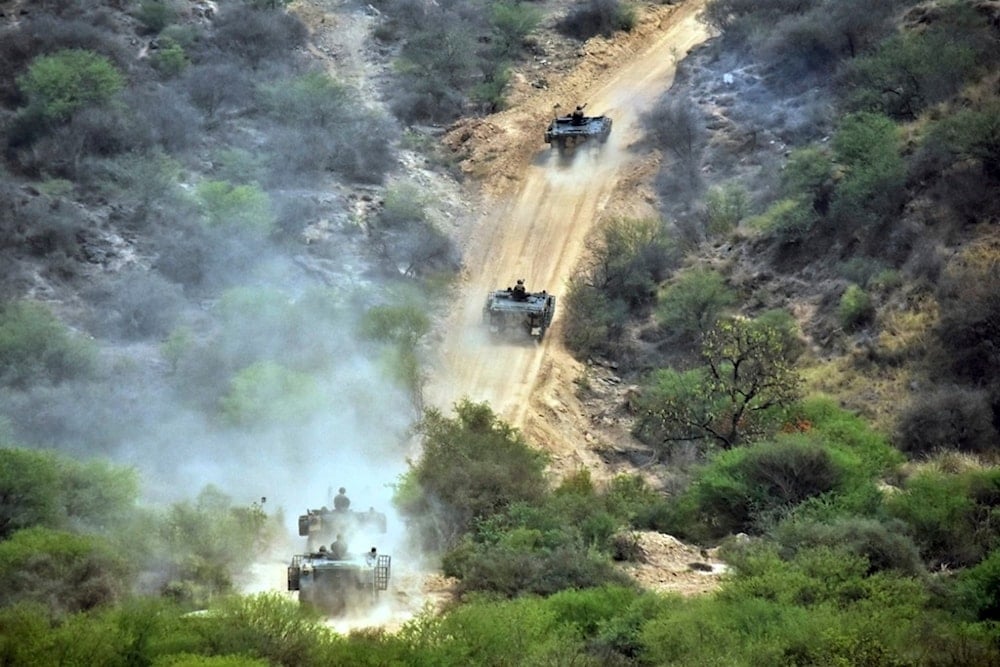Pakistan warns of 'befitting response' amid rising tensions with India
Pakistan vows retaliation as tensions soar with India over the Kashmir attack, condemning the suspension of a bilateral treaty as "reckless".
-

In this photo released by the Inter Services Public Relations, Army tanks roll down during military exercises in Tilla Field Firing Range in the Jhelum district, Pakistan, Thursday, May 1, 2025. (AP)
Pakistan has reiterated its warnings to India against any potential military action, as tensions continue to rise following a deadly attack in the Indian-administered region of Kashmir.
Speaking to Pakistan's Dunya TV on Sunday, Federal Information Minister Attaullah Tarar emphasized that Islamabad had obtained "credible information" suggesting that India was preparing for a possible military strike.
"If India attacks, it will meet a befitting response," Tarar stated during the televised interview.
He highlighted the active involvement of Pakistan’s Army Chief, General Syed Asim Munir, in managing the ongoing situation and stressed that the country's military was fully prepared to respond to any aggression.
Tarar also rejected what he described as India's "false narrative" surrounding the Kashmir attack, claiming that New Delhi was facing "diplomatic embarrassment on the global stage." He maintained that Pakistan had been effectively advocating its position internationally, including through diplomatic outreach with key allies.
According to the minister, Pakistani Prime Minister Shehbaz Sharif has been in direct contact with countries such as China and Saudi Arabia to convey Islamabad’s concerns over "India’s provocative stance."
"The Indian narrative is false. India is embarrassed diplomatically. Pakistan, on the other hand, is succeeding in presenting its case on the global front," he added.
Tit-for-tat escalations
The escalating tensions follow a terrorist attack on April 22 in the town of Pahalgam, which left at least 26 tourists dead. Pakistan has denied any involvement in the incident.
Since the attack, both countries have taken retaliatory steps. India has suspended the Indus Waters Treaty, a key water-sharing agreement brokered by the World Bank in 1960, and has shut down the Wagah-Attari border crossing. In response, Pakistan has halted visa issuance for Indian nationals and closed its airspace to Indian airlines.
Condemning New Delhi’s move, Tarar described the suspension of the treaty as an "unprovoked and reckless move," adding, "India’s hasty move to suspend the Indus Waters Treaty was a childish act." He affirmed that Pakistan would not accept such provocations.
The minister also revealed that Pakistani diplomatic delegations are being dispatched to several countries to strengthen Islamabad’s position and expose "India's terrorism" to the international community.
Deteriorating situation
Indian Prime Minister Narendra Modi granted the military "complete operational freedom" to respond to the incident, intensifying concerns about the potential for military confrontation.
Reacting to India's measures, Islamabad escalated tensions by ordering Indian diplomats and military advisors to leave the country, revoking visas for Indian citizens, and imposing a ban on Indian aircraft using Pakistani airspace.
The developments mark a serious deterioration in an already tense situation in Kashmir, a region long contested by India and Pakistan since the end of British rule in 1947.
Both countries claim the Himalayan territory in full and have fought multiple wars over it, reigniting fears of a broader conflict, with civilians on both sides of the LoC caught in the middle.

 3 Min Read
3 Min Read










